70 per cent of LGBTQ+ employees still feel marginalised at work

A new study highlights the experience for LGBTQ+ employees at work. (Getty Images/PinkNews)
As some companies change their logos to a rainbow for Pride month, a new report has highlighted the negative experiences that LGBTQ+ employees still experience.
As Pride month continues, with businesses holding LGBTQ+ events and voicing support for queer members of staff, new research revealed that 70 per cent of LGBTQ+ people feel lonely, misunderstood, marginalised or excluded at work.
The survey, conducted by the writing platform EduBirdie, found that 59 per cent of queer employees feel their identity is hampering career progression, with 44 per cent having had to quit a job because of discrimination, and 45 per cent believing they had been passed over for promotion because of their sexuality or gender identity.
The report also revealed that nearly half of queer employees feel bosses are bad at raising awareness of their struggle. Fifteen per cent of respondents reported discrimination going unresolved by HR departments and managers, leading more than one in every five, on average, to not report incidents at work.
Even with increased efforts for inclusivity, the data showed 63 per cent of LGBTQ+ people have faced discrimination in their careers.
Impact on LGBTQ+ employees
The consequences of discrimination meant almost half of LGBTQ+ people experienced impostor syndrome at work, fearing they might be seen as a “diversity hire”, and 45 per cent avoided corporate events because of feeling uncomfortable, while 51 per cent altered their appearance to blend in.
The research showed basic acceptance remains elusive, with 30 per cent of LGBTQ+ people concerned about the possible discrimination they could face if they come out at work, and 23 per cent fearing for their safety while “in the office”.
Possibly the most alarming finding in the survey was that, while an average of one in every three LGBTQ+ worker wasn’t comfortable coming out to their colleagues, 40 per cent had their orientation or identity disclosed without consent.
Commenting on the results, EduBirdie’s chief communications officer, Avery Morgan, said: “Despite progress in LGBTQ+ human rights, societal stigma persists. One of the biggest challenges businesses should be aware of is avoiding tokenism and appearing inauthentic in their actions.
“Employers must be genuine with their decisions to bring a more diverse workforce into the organisation.”
Actions speak louder than words
And Dr Jenna Brownfield, a psychologist specialising in therapy for LGBTQ+ people, said: “A lot of the politics at work are about being well-liked by your supervisors and colleagues.
“LGBTQ+ employees have to weigh the risks of revealing their identity at work, considering how it might affect their workplace relationships, career advancement and job security.”
She went on to say that employers should prioritise believing and supporting LGBTQ+ individuals when they report discrimination, even if it seems insignificant.
“Trust that the LGBTQ+ person knows how to spot LGBTQ+ discrimination better than you do,” Brownfield advised. “Blind spots occur when we assume LGBTQ+ discrimination can’t happen in our workplace because we’ve met some basic DEI (diversity, equity and inclusion) standard. But actions speak louder than words.”
Building a workplace culture that discourages and immediately responds to any sort of anti-LGBTQ+ statement promotes openness and humility, she continued.
“It says a lot if a workplace shows openness to feedback that they did something wrong.”
Brownfield called for more queer employees in leadership and decision-making roles, above all else.
“The more that LGBTQ+ employees are part of steering company culture, and not being the sole LGBTQ+ person or token, the more you’ll develop a genuinely inclusive workplace.
“LGBTQ+ people are not a monolith. A workplace should focus on building genuine relationships with each of their employees, instead of only being broadly LGBTQ-affirming.”
How did this story make you feel?

